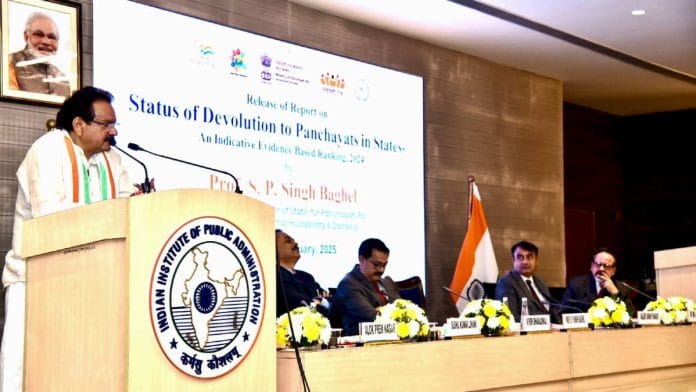New Delhi: Karnataka, Kerala, Tamil Nadu, Maharashtra and Uttar Pradesh are the top five states that have empowered Panchayati Raj Institutions (PRIs) by devolving adequate powers and functions, as mandated by the 73rd constitutional amendment for planned development of villages in India. This was put forth in the Panchayat Devolution Index report released Thursday by the Union Ministry of Panchayati Raj.
Titled ‘Status of Devolution to Panchayats in States—An Indicative Evidence Based Ranking 2024’, the report assessed the states on the basis of provisions under the 73rd amendment Act of 1992, and was released after a gap of nearly a decade.
The amendment of 1992 was aimed at devolution of funds and handing over of 29 functions, including health, housing and roads, to panchayats to empower them as local self-governments. There are 2.6 lakh PRIs, including 2.55 lakh gram or village panchayats, in India.
The India Institute of Public Administration (IIPA), which has prepared the report, assessed states and Union territories on six key parameters: framework, functions, finances, functionaries, capacity building, and accountability of panchayats.
The report states that while overall devolution has increased from 39.9 percent in 2013-14 to 43.9 percent 2021-22, a large number of panchayats continue to face financial issues, causing major challenges in effective functioning.
Karnataka was found to be the best performing state regarding devolution of finances and making panchayats accountable. It is also among the top 10 states in the remaining parameters.
States such as Uttar Pradesh and Tripura, which ranked 15 and 13, respectively, in the previous Devolution Index of 2015-16, have shown significant improvement in the past decade. UP ranked 5 while Tripura stood at 7 in the latest index.
Speaking at the release of the report, Minister of State for Panchayati Raj S.P. Singh Baghel said: “Uttar Pradesh has shown remarkable improvement in the past decade. If UP does well, then the national average of devolution index improves significantly as it has a large number of gram panchayats.”
“The state has shown improvement in making panchayats accountable through transparency and anti-corruption measures and ensuring regular publication of accounts and audits. They are also filling up vacant posts. Other states have also shown significant improvement,” he added.
Gujarat, Tripura, Rajasthan, West Bengal, Chhattisgarh, Telangana, Andhra Pradesh, Himachal Pradesh, Madhya Pradesh, and Odisha have all scored above 50 in the overall performance on strengthening panchayats and other PRIs.

But states and UTs such as Goa, Haryana, Jharkhand, Lakshadweep and Punjab along with the north-eastern and hilly states are among the poor performers with scores below the national average.
Also Read: Panchayat-level weather forecast, rooftop solarisation — Centre’s new rural projects in the pipeline
Where states stand
When it comes to the framework for implementation of the 73rd amendment, the states are expected to conduct elections at PRIs at regular intervals, provide reservation to Scheduled Castes/ Scheduled Tribes and women, set up state election commissions, among others. According to the devolution index report, Kerala tops the list of states/UTs in the mandatory framework, followed by Maharashtra, Karnataka and Haryana.
One of the key aspects of 73rd amendment was to allow transfer of key functions to PRIs to empower them to take critical decisions related to drinking water, roads, housing etc, and let them act as local self-governments.
However, three decades later, a large number of states are yet to transfer all 29 functions to panchayats. The latest index puts Tamil Nadu on the top of the list of states which have devolved a large number of functions to PRIs, followed by Karnataka and Odisha.
In the new report, the ministry has included two new parameters: measures taken by states in capacity-building and making panchayats accountable. Telangana tops the list of states in the capacity building category, while Gujarat ranks first in the “functionaries” (personnel) parameter to provide physical infrastructure, adequate staff strength, internet connectivity, among others. Karnataka ranks first in accountability.
Panchayati Raj secretary Vivek Bharadwaj said measures have been taken to empower PRIs and streamline their functioning, including digital transformation, improving infrastructure such as office buildings, providing computers and internet connectivity.
“This report is not just about devolution of powers; it is about enabling our panchayats to become vibrant centres of local governance in rural areas that can effectively contribute to India’s holistic, inclusive, and sustainable development,” said Bharadwaj.
‘Panchayats in few states have adequate funds’
One of the key ways to empower PRIs is giving powers to them to earn their own source of revenue. Ministry officials, however, said the majority of PRIs are largely dependent on central and state grants and continue to face financial problems due to delay in release of funds.
According to the devolution index, Karnataka tops the list of states when it comes to providing adequate and timely finances to PRIs. It is followed by Kerala, Tripura, Tamil Nadu and Rajasthan.
The central government grants, which are given to PRIs through state governments, are essential for day-to-day functioning of PRIs. “Chhattisgarh, Jharkhand, Karnataka, Madhya Pradesh, Odisha, Punjab, Tripura, Uttar Pradesh are among the states that have released the funds of 15th Finance Commission, and panchayats have also utilised them on time,” the report said.
The PRIs in all states, except Bihar, Jharkhand and Uttarakhand, have been empowered to collect property tax to generate their own income.
“It is recommended that every gram panchayat should be fully empowered and enabled to levy property tax to all types of residential and other properties of any kind… panchayats in only Kerala, Andhra Pradesh, Goa and Gujarat keep respectable funds with them,” the report states.
(Edited by Nida Fatima Siddiqui)
Also Read: India needs a new decentralisation—let politicians manage people, experts handle policies






